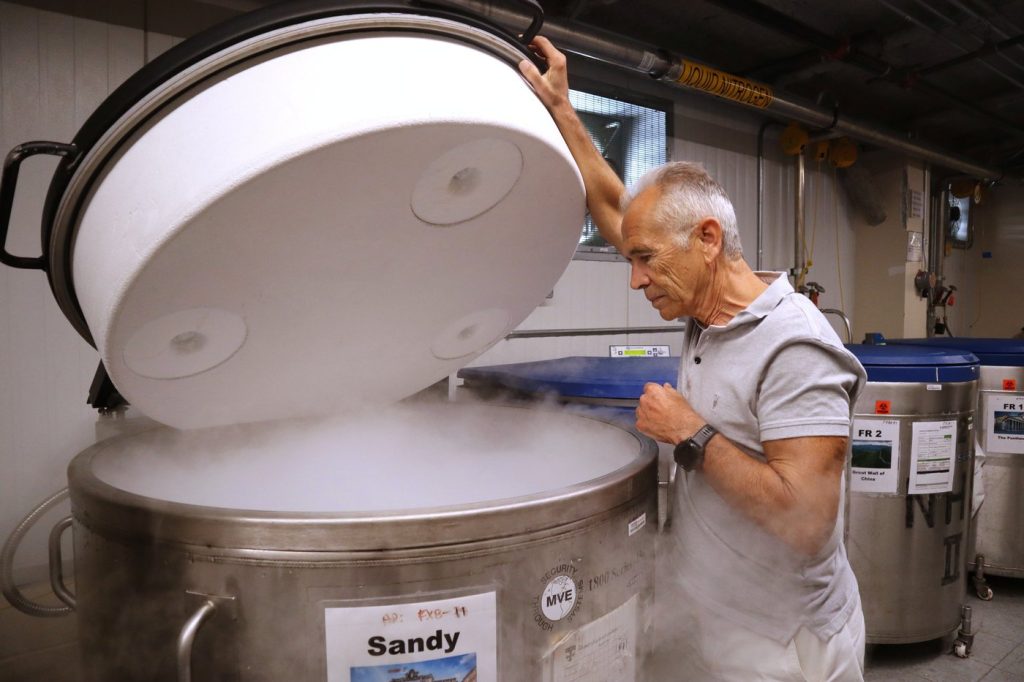CAMBRIDGE, Mass. — Harvard University professor Alberto Ascherio's vital research has come to a standstill after he lost $7 million in federal funding due to a conflict between Harvard and the Trump administration. His work, which focuses on seeking cures for multiple sclerosis and neurodegenerative diseases, relies on blood samples collected over two decades from millions of U.S. soldiers and now preserved in liquid nitrogen freezers at the T.H. Chan School of Public Health.
Ascherio described the situation as akin to building a state-of-the-art telescope ready to launch into space, only to be left without the necessary resources to make groundbreaking discoveries that could benefit millions. The financial blow is part of a larger $2.6 billion funding loss at Harvard, resulting in prominent researchers laying off staff and shelving years of critical work, including studies on opioid addiction and cancer.
Despite ongoing lawsuits and settlement negotiations between Harvard and the administration, many researchers fear that some of their projects may never resume. The funding cuts stem from the Trump administration's prolonged battle with leading universities, particularly with Harvard, in the wake of the university's rejection of demands related to campus protests and admissions policies aimed at addressing accusations of antisemitism.
In response to the funding freeze, Harvard initiated a federal lawsuit against the Trump administration, asserting that the funding was being withheld in retaliation. The university emphasized its commitment to tackling antisemitism but insisted that the imposed funding cuts were irrelevant to the ongoing efforts to combat discrimination on campus.
The Trump administration, on its part, maintains that the grant cancellations were pre-existing and not retaliatory, arguing that the government possesses the discretion to revoke contracts for policy reasons. As a consequence, Harvard’s research community is experiencing a climate of shock and uncertainty, grappling with the reality of shuttered labs and the need to seek alternative funding sources.
In an effort to mitigate the fallout, Harvard pledged to allocate at least $250 million from its own funds to sustain research activities. Yet, as university President Alan Garber noted, this comes with challenges and difficult decisions on the horizon. Ascherio indicated that while salaries for his research team are secured until next June, essential resources for conducting meaningful research remain inaccessible, potentially delaying progress by years.
Rita Hamad, director of the Social Policies for Health Equity Research Center, expressed her distress over the vast knowledge that will be lost due to the funding freeze, particularly as three multiyear grants worth $10 million she was leading were abruptly canceled. At the School of Public Health, approximately 190 grants affecting about 130 scientists have been terminated, causing widespread frustration among researchers.
John Quackenbush, a professor of computational biology and bioinformatics, has faced overlapping cuts, jeopardizing studies that focus on the sex roles in diseases and training programs for doctoral students. He is left questioning whether he can revive his research, even if a resolution is reached between Harvard and the Trump administration, as funding for research becomes increasingly precarious.
Despite the negative impact of these cuts, some faculty members argue that pressure from the Trump administration may have spurred necessary reforms within Harvard. Bertha Madras, a Harvard psychobiologist, called for a review of certain politically motivated social science studies but acknowledged that withholding research funding is a troubling and detrimental strategy.
With the backing of prominent scientists, Quackenbush asserts that these funding cuts represent a broader challenge to the integrity of scientific research, jeopardizing the United States' standing as a leader in global research. The fallout from these funding issues could have long-lasting implications for the support provided to researchers, the international academic community's stability, and the overall success of scientific advancement in the nation.











